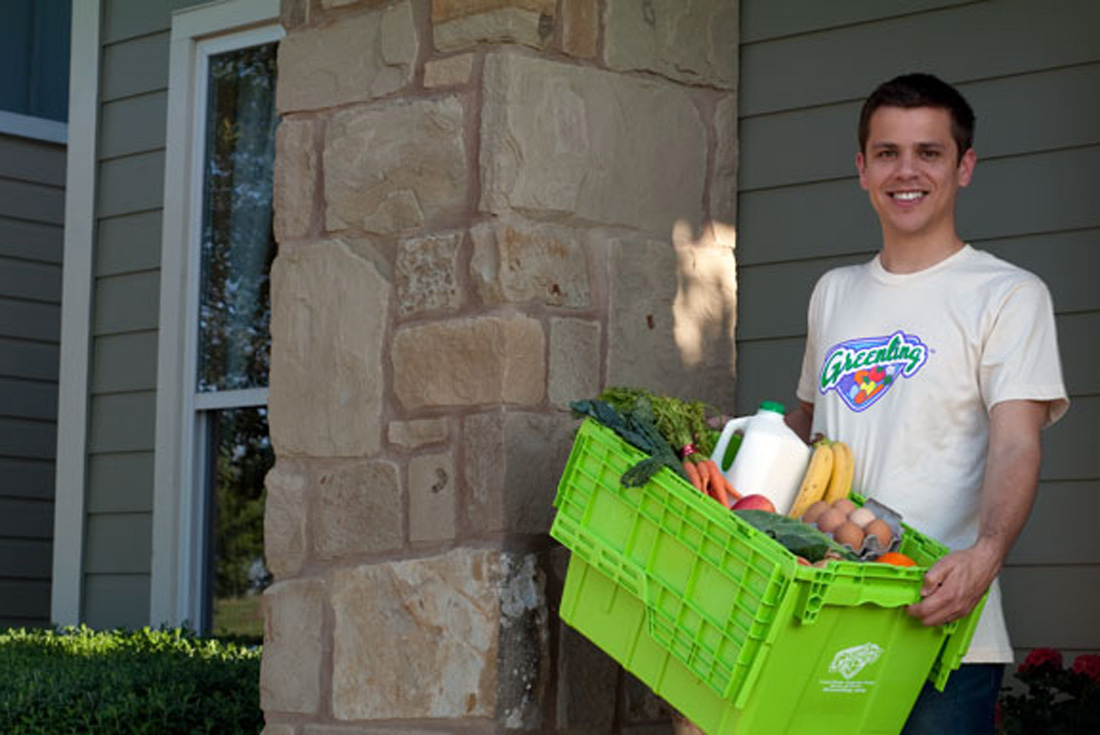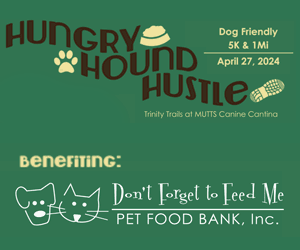When Sherri Glaser saw an ad online a few months ago for Greenling, a home-delivery service specializing in local and organic food, she was eager to support the venture. When her third order came last Wednesday, she received a few items currently unavailable at the farmers market, like shiitake mushrooms. The peaches and plums were not the kind one would find at the grocery store — these were tiny, more like homegrown — but they reminded her why she buys local in the first place.
“My grandparents were dairy farmers and always had a huge garden, so my heart is with local farmers,” Glaser said. “I prefer to shop at the farmers market, but I have to travel 11 miles across town to get there, and I don’t always have the time.”
Greenling, which started in Austin and moved into the Metroplex at the beginning of the year, aims to solve that problem. Glaser sees the company’s expansion here as a sign that locally produced food is going mainstream and reaching more people.
“Distribution is the weak point in local food,” explained Gwin Grimes, owner of Fort Worth’s Artisan Baking Company and a board member of a local farmers market. She therefore sees Greenling’s entry as a positive development, not as competition — though, as yet, few of the roughly 30 vendors at the Cowtown Farmers Market are selling regularly to the company. “They’ve approached us, but their distribution center is in Allen, and driving out there would mean losing a day of production for most of us,” Grimes said.
From its warehouse in Allen, Greenling aggregates produce and other agricultural products (honey, dairy, meat) and then trucks orders to customers based on zip codes. The list of what’s available is updated weekly, orders are placed online, and shoppers can customize or choose a predetermined box. Brett Russell, who oversees the company’s North Texas operations, said that, after only six months, the weekly delivery list has grown to more than 800 in the Dallas area and close to 200 in Fort Worth.
With home delivery, Greenling offers one possible solution to the challenge of distribution. However, the luxury of home delivery in turn reflects the other major challenge to the local and natural food movements — cost.
As supportive as she is of local food, Glaser said Greenling is still a little too far out of her price range to become a mainstay in her home. “I can’t spend several dollars, say, for free-range, local eggs when there’s an ad in the paper for 69-cent eggs,” she said. “I’ve done that with Wal-Mart: They’ll match anybody’s price, but I make it my policy not to shop there. I’m willing to shop more. But I haven’t made the switch [to local food] yet for some of the things that are so much more expensive.” After all, she said, Greenling’s $34 “local box”— a little smaller than one of those old green curbside recycling bins — has never been even half full the three times she’s ordered it.
Still, Greenling “serves a need and it’s going in the right direction,” she said.
“It’s difficult for retailers to pitch home delivery as anything other than a fairly expensive luxury for people who have more money and not enough time,” said John Rand, an industry consultant with Kantar Retail in the Boston area. According to market research, the typical customers come from two-earner households, live in densely populated urban corridors, and are relatively well off. The four or five areas where home delivery is viable also happen to be on the coasts. “In Texas, where could I get the most people in the least amount of space? I would say Dallas,” Rand concluded.
Indeed, you won’t find many other home-delivery grocers in these parts. One of the few remaining options in town is also its oldest: Roy Pope Grocery in the Arlington Heights neighborhood. The upscale grocer makes deliveries in six zip codes, as owner Bob Larance says the store has done since it opened in 1943. Many of the shop’s most loyal customers, who have stayed with them for generations, are now in retirement homes or no longer drive.
Larance said the service has never been profitable. Naturally, he was skeptical of Greenling’s prospects.
“There isn’t a chain around that hasn’t tried it and gotten out,” he said. “I’d hate to make my living from deliveries.”
Retailers from Albertson’s to Tom Thumb, as well as internet start-ups, have tried over the years to break into the delivery market but nothing has ever taken root. Dallas-based GroceryWorks.com, for instance, signed an agreement with Safeway in 2000 to handle online deliveries for the chain and its affiliates. The following year, GroceryWorks.com was acquired by Safeway and put out to pasture.
Greenling owner Mason Arnold said delivery was the only extra that those companies offered, whereas his firm is “bringing people fresh, local, and organic food that gives them a connection to the farmers who produce them.”
Because Greenling can add organic/local food fans to the ranks of those willing to pay for delivery, onlookers like Rand see reason to believe the company might make it.
Greenling has done well in Austin since it’s founding in 2005. For several years now, readers of the Austin Chronicle have voted it the best local food company in town.
When it was time to expand, Arnold said, he and the staff chose Dallas-Fort Worth over Houston because, “We were impressed with what was going on in the local food movement here.”
The company quickly linked up with the Allen Economic Development Corporation, which helped find a location for the distribution center and also helped Greenling with information on North Texas marketing and hiring.
“This is a little out-of-the-box for us,” said Dan Bowman, assistant director of the AEDC. “Allen is a high-tech community — we don’t have much of a food community.” Bowman knew that home-delivery services had been tried and generally failed in North Texas but said that Greenling’s success in Austin was enough to convince him.
In addition to creating jobs in the area, he hopes the company will be the first in a series of eco-friendly businesses based in Allen, tied together by a set of local investors. To that end, the AEDC is supporting Greenling with incentives, including a several-year grant if the company’s job creation goals are met annually.
“Greenling is … giving customers a route to get food from a local or in-state farmer and to get it fresh with the least amount of effort,” Rand said. “That’s a very high-value proposition. I applaud both them and the town of Allen to be willing to do something a little off the beaten path.”
Zack Shlachter is a Fort Worth writer and frequent contributor to Fort Worth Weekly.













My apartment neighbor and I share a Greenlings local box every other week. We have been doing it for a month or two and are pretty happy with the way it works out.
We both get enough out of it that we don’t have to buy produce that week at the grocery store. And if we did, since we buy organic and often local when we can, it would end up being about $15 to $17 worth of produce anyway.
We have a decent sized garden that supplements our Greenling box, too. On my end at least, I now rarely buy vegetables at the grocery store. Maybe some fruit but even that can easily be procured for a fair price at a farmers market or roadside stand.
Oh, and I’m definitely not well off. But bills get paid and putting healthy, socially responsible foods into our bodies is important for my fiance and me. So, I just make the household budget work so that we can afford Greenlings.
I hope they keep up the good work.